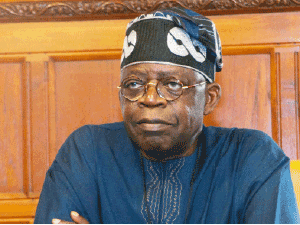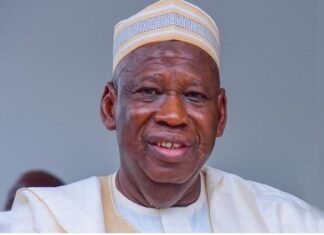HENRY ODUAH writes on the man whom Nigeria’s president-elect, Muhammadu Buhari, described as the brain behind the merger that gave birth to the much-desired change.
Like Mahatma Gandhi of India, Abraham Lincoln of the United States, Nelson Mandela of South Africa, it remains unbelievable that one man can have so much influence on the activities of a nation. Asiwaju Bola Ahmed Tinubu has found the right formula which confirms him as a leading statesman.
Born in Lagos on March 29, 1952 to the Tinubu family, he attended St. John’s Primary School, Aroloya, Lagos, and Children’s Home School in Ibadan. Tinubu left the shores of Nigeria to the United States in 1975 in the quest for academic excellence. He studied at Richard J. Daley College in Chicago, Illinois, before moving to Chicago State University for studies in Business Administration (Accounting and Management). He then graduated in 1979.
Faced with initial difficulties of studying at Richard J. Daley College, Tinubu resorted to menial jobs like dishwashing, night guard and cab driving.
His outstanding academic performance would sooner than later hand him a job with American companies, Arthur Anderson, Deloitte Haskins and Sells (now called Deloitte Haskins and Touche) and GTE Service Corporation – the largest communication and utility company in the U.S.
On his return to Nigeria, he joined Mobil Producing Nigeria as a Senior Auditor before retiring as the company’s Treasurer.
Tinubu’s contribution to Nigerian politics was first felt in the founding of the defunct Social Democratic Party (SDP). His involvement in community-friendly programmes and policies subsequently landed him at the Senate in 1992 where he represented Lagos West senatorial district. He also served as Chairman of the Senate Committee on Banking, Finance, Appropriation and Currency.
With the annulment of the June 12, 1993 Presidential Election, Tinubu became a founding member of National Democratic Coalition (NADECO), a pro-democracy group which mobilised support for the recognition of the election results. As is customary of military regimes, Tinubu’s involvement with the NADECO brought harassments and threats to his life, forcing him to flee Nigeria in 1994. He returned to the country in 1998 after the death of Gen. Sani Abacha.
With the support of bigwigs in the Alliance for Democracy (AD), he won the party primaries which he contested alongside Funsho Williams (of blessed memory) and Wahab Dosunmu. He was elected governor of Lagos State in the 1999 elections and re-elected in 2003. The Asiwaju was involved in a struggle with the federal government over whether Lagos State had the right to create Local Council Development Areas (LCDAs). This ultimately led to the seizure of funds meant for local councils in the state.
Interestingly, the astute politician with a Midas touch was not done with Lagos, even after serving as governor, as he brought in Babatunde Fashola as governor of the state in 2007 under the auspices of the Action Congress of Nigeria (ACN) formed by the merger of the Alliance for Democracy, the Justice Party (JP), the Advanced Congress of Democrats (ACD) and other minor parties in 2006. People who thought they knew better cried foul over the ‘imposition’ of a little-known lawyer on the Centre of Excellence; they thought the likes of Jimi Agbaje, who put up an excellent campaign then, would have been a better choice. But Tinubu ignored all criticisms over his action because he knew who he was throwing up.
Unexpectedly, Fashola excelled beyond people’s imagination. There are those who argue that Fashola is the best governor the state has ever produced. In fact, there is confusion over who between him and Lateef Jakande did better. Little wonder he was re-elected in 2011 by popular demand. But, of course, the praise goes to the Asiwaju for laying a good foundation to receive Fashola’s brilliant and exceptional ideas which today have materialised.
At the national terrain, the Jagaban of the Borgu Kingdom of Niger State had allegedly, in 2011, supported President Goodluck Jonathan of the Peoples Democratic Party (PDP). His support was said to be the fillip PDP needed to run over other parties in the presidential contest, polling almost half of the total votes.
And when he withdraw his support, “the largest political party in Africa” crumbled. That was what happened in the March 28 presidential election.
Tinubu raised the team that portrayed Gen. Muhammadu Buhari as a competent leader to the nation and in particular the South West. Buhari was arguably more like a local champion in the Northern part of the country when he contested the 2011 presidential elections. Results from the 2011 elections show that Buhari, then in the Congress for Progressive Change (CPC), garnered 321,609 votes in the entire South West states, while his counterpart, Jonathan of the PDP, assembled over two million votes. But the 2015 election figures show that Tinubu’s grand support for Buhari earned him victory in five South West states – Ogun, Osun, Oyo, Ondo, and Lagos – with the PDP clinching majority of Ekiti votes.
Also, the timely selection of Professor Yemi Osinbajo as Buhari’s running mate could be attributed to Tinubu, as it endeared him to the people of the South West. Prior to the presidential elections, predictions had it that votes in the North East and North West would go Buhari’s way, while Jonathan would amass votes in the South East and South South, and that the North Central would likely be evenly distributed between the two candidates. The more intriguing prediction was that the winner of the election would emerge from whoever wins the South West. Of course, Tinubu played his cards well.
But amid the praises, Tinubu has had challenging moments. In all, he is still trudging on.
As APC basks in the euphoria of electoral victory, the former governor has wasted no time in congratulating the winner of the presidential election, Buhari, describing his victory as the finest moment in Nigeria’s political history.
“It is a moment when hope is re-born, faith is rekindled and a fresh fire of patriotism is released for the task ahead. I congratulate General Buhari, Nigeria’s president-elect, on his hard-won victory. I salute our gallant party leaders and members for running the long distance to victory. To millions of Nigerians, I say this: the APC seeks not power for its sake, but for the purpose of bringing a better life to our people and re-building our country,” he said.
The kingmaker has received several awards for his performance. On his shelf is the award for Best Governor in Nigeria (Year 2000) by the Nigerian-Belgian Chamber of Commerce; Year 2002 Best Practices Prize in improving the living environment, awarded by the Federal Ministry of Works and the UN Habitat Group; and Best Computerised Government in Nigeria Award (Year 2000) by the Computer Association of Nigeria. He was conferred with the Honorary Doctor of Law Degree by the Abia State University, in recognition of his immense contribution to democracy, good governance and development of Nigeria. He is a recipient of numerous chieftaincy titles and a patron of many professional and social organisations.
Now that Tinubu has pulled the shot and scored the winning goal, Nigerians can only be hopeful that his product, Buhari’s administration, will give Nigeria the needed change.
Tinubu, who turned 63 recently, is married to Oluremi, who has been re-elected to the Senate to represent Lagos Central.













